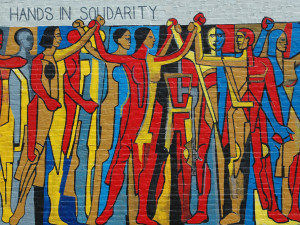December 18 is International Migrants Day

Sometimes this important recognition gets lost, especially for Christians, in the preparations for Christmas. Yet when we really think about the Christmas story, we meet God’s people on the move, travelling to meet imperial demands, fleeing in terror at imperial edicts. Sacred texts remind us of a God of the Tent who accompanies Her people wherever they go. In this time, where borders are restricted, but disasters, war and economic injustice continue, we join hands with migrants among us—refugees, workers, people undocumented, those stuck in immigration limbo, or people separated from families.
God of the Tent, We pray for Your accompaniment, for our bold action, for community compassion, and for connection across necessary distance. We are Your people on the move. May our movement be for dignity, status, and home for all. Amen
Each of us who acknowledges the original inhabitants of a territory with the name of a people or a nation that is not our own, acknowledges that we or our families are migrants. This practice that has become common place in our meetings and our worship gatherings not only speaks to reconciliation with the original peoples but reminds us that migration is a deeply human story, touching almost every person, every family. Its about being human.
Sometimes in churches and society, we think of migrants as the “other,” and so at best our response, consistent with the scriptural call for care of the poor, widow or orphan, is a response of charity. Perhaps we offer English classes, provide pastoral care, ensure worship and programs are accessible in the language of the migrant community. We try to be “inclusive” but the idea is still that we own the church or organizations and are graciously including people into a community that we define. Our welcome is conditional, and we are the host, with all the power this expresses.
Nations can act this way too, extending the periodic hand of welcome to “our” country to deserving migrants, including people within borders we rigorously define. The welcome is conditional, migrants of centuries past hold all the power to accept, to decline—to leave what we call undeserving migrants to die. We are countries, churches, communities with borders—colonial borders—controlling who comes in and who goes out.
While we are called to respond to the immediate and essential needs of migrants – whether to provide accompaniment when rights are violated, to assist in exiting an abusive work environment, to advocate to stay a deportation order or to provide warm clothing and food in the winter…
Our job is to turn this system upside down and inside out:
- To remove the us/them division—migration is a human condition,
- To complement our instincts of charity with instincts of justice,
- To reflect a commitment to human dignity— Christian traditions say the dignity of each person made in the image of God—to reflect human dignity in equal rights,
- To see ourselves as having common cause to build a just country – Indigenous, settler, newcomer, migrant – together in mutual respect.
KAIROS then, is being faithful, when we stand in solidarity with migrant people, migrant workers as they advocate for justice.
This December 18 or on Fourth Advent, mark International Migrants Day by learning and sharing more about Migrant Justice and joining the Status for All campaign.








